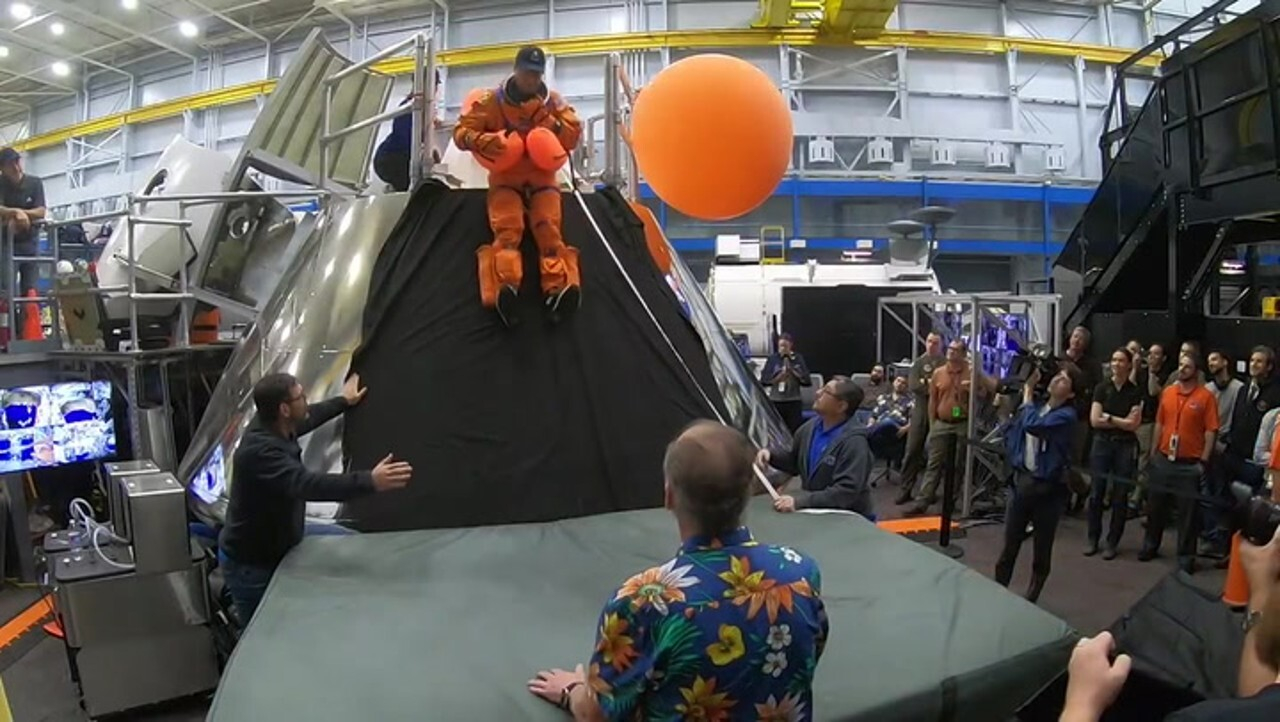Watch Artemis 2 moon crew take a slide for NASA training (video)
It's part of 18 months of training for a round-the-moon mission.

Instead of a sleigh ride, the next moon astronauts had a slide ride ahead of their 2024 mission.
The Artemis 2 moon crew practiced how to get safely out of their Orion spacecraft after an ocean splashdown should they need to leave in a hurry, and they recorded the activities on video. As you can see, the emergency procedure has the astronauts leave the spacecraft and slide down into simulated ocean water, wearing floatation devices, to wait for recovery teams in the ocean.
In order, here is who made the brief holiday ride on video: NASA pilot Victor Glover (who will become the first person of color to leave low Earth orbit), NASA commander Reid Wiseman, NASA mission specialist Christina Koch (the first woman) and Canadian Space Agency mission specialist Jeremy Hansen (the first non-American).
Related: Why Artemis 2 moon launch with astronauts is different from Artemis 1
Artemis 2 aims to be the first in NASA's greater Artemis program to send humans around the moon. Artemis 1, an uncrewed mission, already tested out most of Orion's systems along with the huge rocket, known as the Space Launch System. Artemis 2 will bring the astronaut quartet on a round-the-moon mission after doing testing of the life support system and other elements in progressively higher orbits around Earth.
The four astronauts are doing at least 18 months of training to prepare for the big opportunity, which might be delayed given it is a developmental mission in which training procedures are being formulated as they go.
But after the crew met with U.S. President Joe Biden last week to discuss their training progress, Wiseman emphasized to reporters that deadlines are not their concern. "As the crew, we don't even think about the date," Wiseman said in a gaggle with reporters, according to ABC News. "We will go when NASA and the vehicle are ready to fly."
Get the Space.com Newsletter
Breaking space news, the latest updates on rocket launches, skywatching events and more!
As the crew continues their training, key hardware for the mission is being assembled around the United States. The boosters and Orion are in testing and construction at NASA's Kennedy Space Center, the core stage of SLS is being readied for shipment at NASA's Michoud Assembly Facility in New Orleans, and a key adapter that connects Orion to SLS is at Marshall Space Flight Center in Alabama.
Meanwhile, the mobile launcher is being tested at the launch pad at KSC before being rolled into the famous Vehicle Assembly Building (VAB) in a few months. As long as the mission timeline holds, NASA will then stack the core stage, boosters, adapter and Orion in the VAB in summer and fall 2024 ahead of the expected launch at the end of the year.
Join our Space Forums to keep talking space on the latest missions, night sky and more! And if you have a news tip, correction or comment, let us know at: community@space.com.

Elizabeth Howell (she/her), Ph.D., was a staff writer in the spaceflight channel between 2022 and 2024 specializing in Canadian space news. She was contributing writer for Space.com for 10 years from 2012 to 2024. Elizabeth's reporting includes multiple exclusives with the White House, leading world coverage about a lost-and-found space tomato on the International Space Station, witnessing five human spaceflight launches on two continents, flying parabolic, working inside a spacesuit, and participating in a simulated Mars mission. Her latest book, "Why Am I Taller?" (ECW Press, 2022) is co-written with astronaut Dave Williams.









